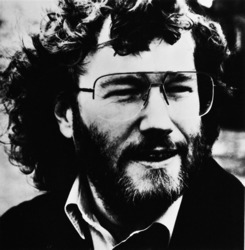 Myriad tributes have flooded cyberspace since Iain M. Banks, one of Scotland’s greatest modern writers, finally succumbed in his heroic losing battle against cancer. I want to spotlight one small aspect of all the work and life he crammed into his 59 years: his perspective on e-books and the state of publishing. Banks was a great if idiosyncratic futurologist, besides a model writer, and both are represented here.
Myriad tributes have flooded cyberspace since Iain M. Banks, one of Scotland’s greatest modern writers, finally succumbed in his heroic losing battle against cancer. I want to spotlight one small aspect of all the work and life he crammed into his 59 years: his perspective on e-books and the state of publishing. Banks was a great if idiosyncratic futurologist, besides a model writer, and both are represented here.
In his 2010 interview with SciFiNow, Banks agreed that digital books would eventually supplant physical books—but definitely from a perspective born of the 1950s. “I can imagine, I suppose, having bought a book and not having the physical thing, but I always like to have the thing itself,” he remarked. “So if there was some sort of package where I could buy the book and get the eBook then definitely. I mean it saves space when you’re going on holiday, taking one slim thing that’s got loads on it. So yeah, I really do, I mean I can read a lot off my iPhone, and it’s not that bad. I can’t see myself buying an iPad because I’ve got too many bloody Apple macs already.”
* * *
* * *
Some of the eulogists’ views of Banks’s approach to good writing stray away from craft and practical skills towards preconceptions and worldviews, but Banks himself left quite a record—literally—of his take on both the craft of writing, and the state of the publishing industry up against digital disruption.
“Publishing itself, is much less collegiate, much less of an old-boy’s-network, and much more corporatized now. There’s only about three really big publishers in London now, and they’ve all got international presence as well,” he told Derek Neale, UK Open University lecturer in Creative Writing, in a recording for the OU’s OpenLearn website in 2011. “If you’re a science fiction writer or a science fiction reader, you’re always impatient for things to get better.
“The biggest real change is not audio editions, it’s more the digitalization of books themselves. Ebooks and Kindles are much more fundamental as potential loci of change than audio books … No technological change ever necessarily signals the end of the earlier version. People still paint and buy paintings, even though the camera came along … We still take photographs, people still go to the theater and write plays, even though the cinema came along … I don’t think any of these things necessarily mean the end of the earlier version. Personally, I just like books, I like the feel of books, I like having the books.”
“Where publishers are feeling the greatest hurt is reference books,” he added. “It’s so much easier to do that stuff and keep it right up to date on the web. Novels are kind of different. To some extent the traditional business model will suffer because of the digitalization of print. I think a lot of publishers are scared stiff … I don’t think it has to be that terrible. It’s such a cliche, but you have to look at it as an opportunity rather than as a threat. But it does require some pretty fancy footwork on behalf of publishers, and traditionally they’ve not really been that fast-moving … They’re trying their best to move with the times. We’ll see how it works out.”
Preserving text in digital form might be small beer for Banks’s science fiction universe of the Culture, which Sublimes entire civilizations into pocket dimensions, but even the ultimate embodiment of its technological might—transcendent AI Minds—depend on language, and even letters. “Even hyperspatial light speed implies the sort of message-time delay that, most of the time, forces the Minds … to compose what are in effect letters to each other,” Banks asserted. “They take their intellectual integrity very seriously indeed, and so language—language much as we would understand it—remains at the core of their most profound communications.”
No surprise that as an industrious and versatile writer as Banks should keep writing and language at the core of his predictions even at their farthest reach. “We embody the idea of narration in our lives,” he concluded to Neale. “Narration is what we’re all about.”
































So sad that this great writer and man has departed. I loved his work and I am still fascinated by his insights – recorded in video and text form. A wise voice with vision and clarity. He worked so hard and wrote so much. RIP Iain Banks, I’ll miss catching up with your mixture of book genres. Sympathies to his family and friends.